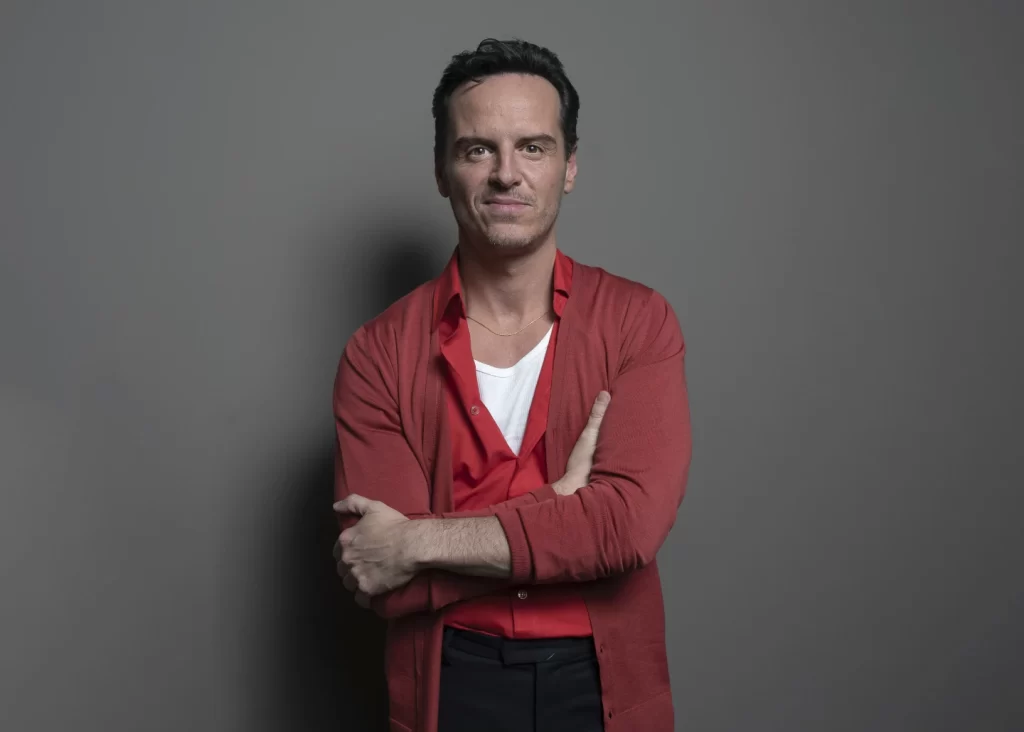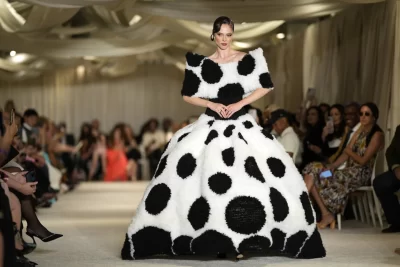
NEW YORK — On a recent winter day in New York when the sun was shining, Andrew Scott rushed into a coffee shop between recording sessions for an upcoming series.
“I’m scheduled tighter than a teenage pop star,” he said, beaming.
The interview had been postponed once, and the location was switched at the last minute to save Scott some time in traffic. But he sat down fully engaged and eager to start talking. Immediately, though, a passerby tapped on the storefront glass and asked for a photo. Scott, without a grumble, sprinted out to oblige, even though the gesture seemed more like a command (“You’re under arrest,” joked Scott) than a polite request.
“The challenge of it was to try to go to that place but not gild the lily too much,” Scott says. “As an actor, I have to be in touch with that playful side of myself and that part of you that’s childish. I was actually quite struck by how vulnerable I looked in the film.”
Scott’s acutely tender performance has made him a contender for the Academy Awards. He was named best actor by the National Society of Film Critics. At the Golden Globes on Sunday (Scott wore a white tux and t-shirt), he was nominated for best actor in a drama.
Scott has long admired actors like Anthony Hopkins, Judi Dench and Meryl Streep — performers with a sense of humor who, he says, “are able to understand what you feel and what you present.” Scott, too, is often funny on screen (see Lena Dunham’s medieval romp “Catherine Called Birdy” ). And even in quiet moments, he seems to be buzzing inside at some discreet frequency. Something is always going on under the surface.
He’s been acting since he was young; drama classes were initially a way to get over shyness. Scott’s first film role came at age 17. He has often spoken about seeking to maintain a childlike perspective in acting. In that way, “All of Us Strangers” is particularly fitting. On Adam’s trips home, he sort of morphs back into the child he was. In one scene, he wears his old pajamas and crawls into bed with his parents.
“So many of the things that are required of you as an actor are a sense of humor and some ability to be able to put yourself in a situation. Because it’s all down to imagination,” says Scott. “For me, that’s the thing you need to keep. That’s the thing — because I started out when I was young — I don’t want to move too far away from. Like when kids go, ‘OK, you be this and I’ll be this.’ That ability doesn’t leave us. What does leave us is a lack of self-consciousness. Our job is to hold on to that.”
Haigh, the British filmmaker of “45 Years” and “Weekend,” began thinking of Scott for the role early on. They met and talked through the script for a few hours.
“He’s a similar generation to me. He’s a tiny bit younger than me, but he’s from the same generation,” says Haigh. “He understands that experience.”
Scott came out publicly in 2013, but his natural inclination is to be private. “I feel like I’ve given so much of myself in the film, you think you don’t want to give it all away,” he says. He describes “All of Us Strangers” — which Haigh shot partly in his childhood home — as personal, but not autobiographical in its depiction of the alienation that can linger after coming out.
“Mercifully, I feel very comfortable for the most part. But it stays with you that pain, and it actually makes you more compassionate, I think. Because we shot in Andrew’s childhood home, that sort of threw down the gauntlet in relation to how much of his own personality he was giving,” says Scott. “I wanted it to be sort of unadorned, unarmored and raw. That’s why I think there’s such tenderness in the film.”
Scott has sometimes recoiled from how sexuality is talked about the media and in Hollywood. He recently said the phrase “openly gay” should be done away with. As of late December, Scott hadn’t yet watched “All of Us Strangers” with his parents, though he planned to.
“The best way to express it is to say I’ll be very sensitive to how they watch it and how they feel about it, and how it makes me feel them watching it,” Scott says.
The tenderness in the film is also owed in part to Scott’s chemistry with Mescal. On-screen chemistry is an amorphous quality that the film industry has long tried to turn into a science with camera tests and marketing that flirts with real-life romance.




